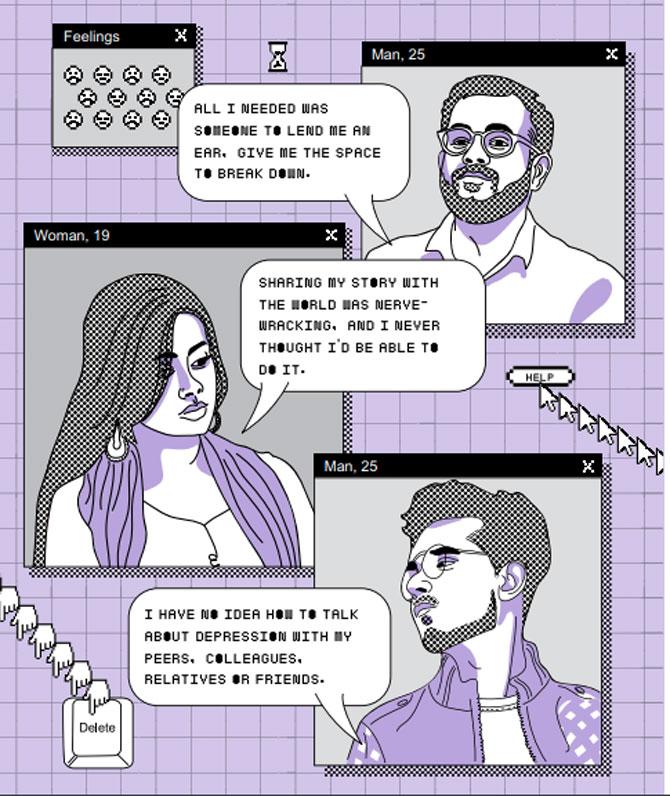While the resistance against these ideals must and does take place on multiple locations, social media remains an important one to make accountable for such distress due to its almost global relevance and large reach with youth age groups

While the resistance against these ideals must and does take place on multiple locations, social media remains an important one to make accountable for such distress due to its almost global relevance and large reach with youth age groups.
ADVERTISEMENT
Details of how social media has fundamentally and forever changed the way we interact with each other and ourselves are well-documented. One need look no further than the growing online cultural glossary and the way it has made it intoour spoken language. An important note is that the majority users of most social media platforms across the world are from ages 15-29, and its remains largely a youth-driven space and culture.
With this population, a long-standing debate has been the impact of social media platforms on mental health. Some studies point to a correlation between social media usage and impacted mental health, and comment ondistress born from cyberbullying and other serious privacy concerns such as stalking, sexual harassment, and the frequency of misogynistic crimes on social media such as revenge porn. Others stress the benefits of online communities for marginalized and disconnected youth. What is undeniable, however, is the reach of such platforms for this age group, and the extent to which such platforms inform our lives.

To their credit, several social media platforms allow for action to be taken if someone expresses severe distress on their sites. Once reported, the user often receives a message, checking in, and offering mental health resources. Some social media companies also partner with mental health campaigns to raise awareness, increase access to resources, and issue warnings on content that might be upsetting and triggering.
The question remains whether such initiatives are enough, given the extent to which our lives are intertwined with social media. Surely, the breadth and depth of mental health issues and reasons for distress that young people face cannot be addressed alone by social media platforms. So much of it is out of their control. What instead, can be done about their role in contributing to mental health issues of their users through their content and platform structure, something that remains within the control of these companies?
Movements invoking social media’s accountability haverecently gained traction. Examples include criticisms of Instagram’s allowance of diet culture products being marketed to minors using the platform. Facebook is being implicated in allowing white supremacist groups to gain visibility and accrue power in the U.S., despite their clear violations of terms of use which bans hate speech. Snapchat also faces criticisms for its whitewashed filters and filters that contort body features to fit beauty ideals.
Other apps that also add to a homogenous, and often harmful, understanding of beauty are photo-editing apps specifically for physical appearance, such as Facetune. These apps allow for the user to digitally and conveniently remove pores and other marks on the skin, lighten skin color, and renderfacial features skinnier. The use of such apps, as the world went into lockdown over COVID-19 concerns and resulted in increased online presence, went up by 20-25%. Facetune claims not to market to minors. Still, another study found that the majority of young girls using social media to post pictures of themselves also engage in editing and of their images.
The fact that most users today develop an online presence and engage with these apps at a young age points to a key mental health issue online: that of body image, self-esteem, and its relation to social media usage. Studies and clinicians correlate not only mental health concerns such as general anxiety and depression to social media usage, but also negative body image, increased body dissatisfaction, and anxiety specific to physical appearance. Repeated digital contortion of the face and body into shapes and features that are not reflective of appearances in real life adds to a sense of dissatisfaction, as we begin to further equate the filtered versions of ourselves with the desired versions of ourselves. This is in part due to the design of these filters, which reflect unrealistic, colonial, and harmful ideals of beauty: whitened skin, light colored eyes, clear skin, smaller features, and skinnier proportions. These ideals are not exclusive to social media platforms—almost all forms of mainstream media that one consumes anywhere in the world has long fed into these narratives of what a person should look like in order to be beautiful, and therefore, in patriarchal societies, valuable.
While the resistance against these ideals must and does take place on multiple locations, social media remains an important one to make accountable for such distress due to its almost global relevance and large reach with youth age groups. Though stressors discussed here may be considered regular aspects of adolescence and young adulthood that one grows out of, what is missing from the picture is that the connection online nowadays is constant and stable over time, and that such mental health concerns can impact and contribute to larger mental health issues, disorders, and illnesses that can be lifelong. Eating disorders, often associated with higher body dissatisfaction, remain the cluster of mental health diagnoses with the highest mortality rate, and disproportionately affect young women and girls, LGBTQ+ community members, persons with disabilities, and are largely underdiagnosed in BIPOC. If we are to approach social media as a location for addressing mental health issues, from a psychosocial perspective it is also imperative to address how the platform itself impacts mental health by adding to cultures of harm.
Realization of this need for social media’s accountability has already led to progress. Jameela Jamil, actress and activist led a campaign through her body positivity platform “I Weigh” to advocate with Instagram in shutting down brand marketing of diet products that are not medically proven to help one lose weight, to minors using the platform. The minor users now receive a warning before they can proceed to view such content. With an increasingly aware youth user-base, which is the most impacted as well as most help-seeking generation yet with regard to mental health, it would serve platforms well to address mental health not as an issue located solely in the user, but also in the structures of the platforms that companies create to engage such users. Actions speak louder than hashtags.
Author bio: Saisha Manan is a Grants Manager at Mariwala Health Initiative. She holds a Bachelor’s degree in Psychology from Bard College at Simon’s Rock, for which she wrote a thesis evaluating community-based trauma interventions as accessible forms of mental health care
Keep scrolling to read more news
Catch up on all the latest Crime, National, International and Hatke news here. Also download the new mid-day Android and iOS apps to get latest updates.
Mid-Day is now on Telegram. Click here to join our channel (@middayinfomedialtd) and stay updated with the latest news
 Subscribe today by clicking the link and stay updated with the latest news!" Click here!
Subscribe today by clicking the link and stay updated with the latest news!" Click here!






